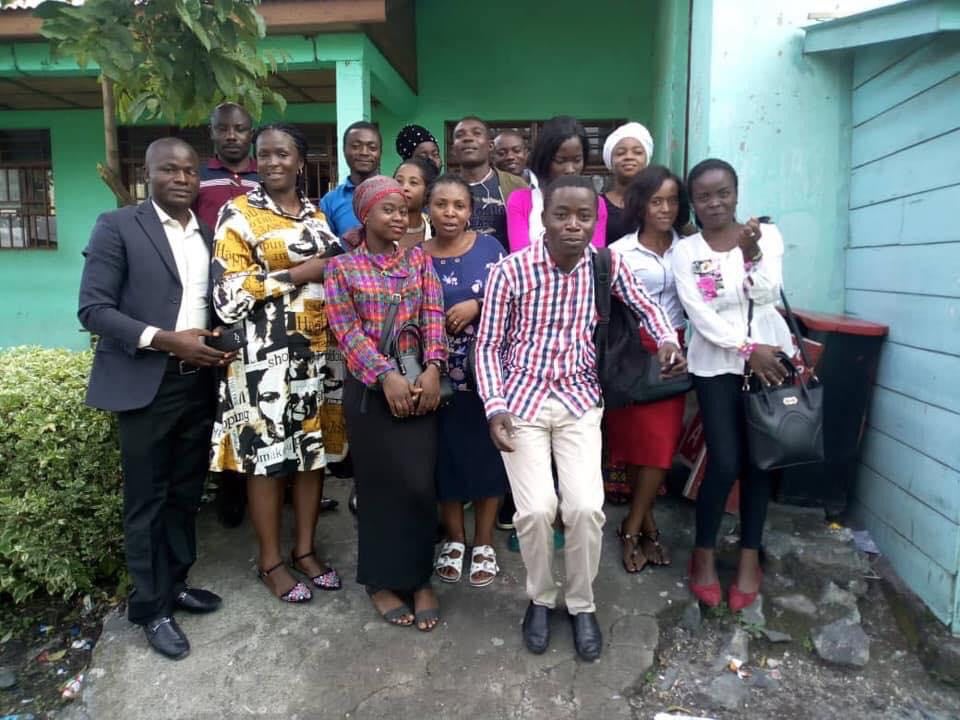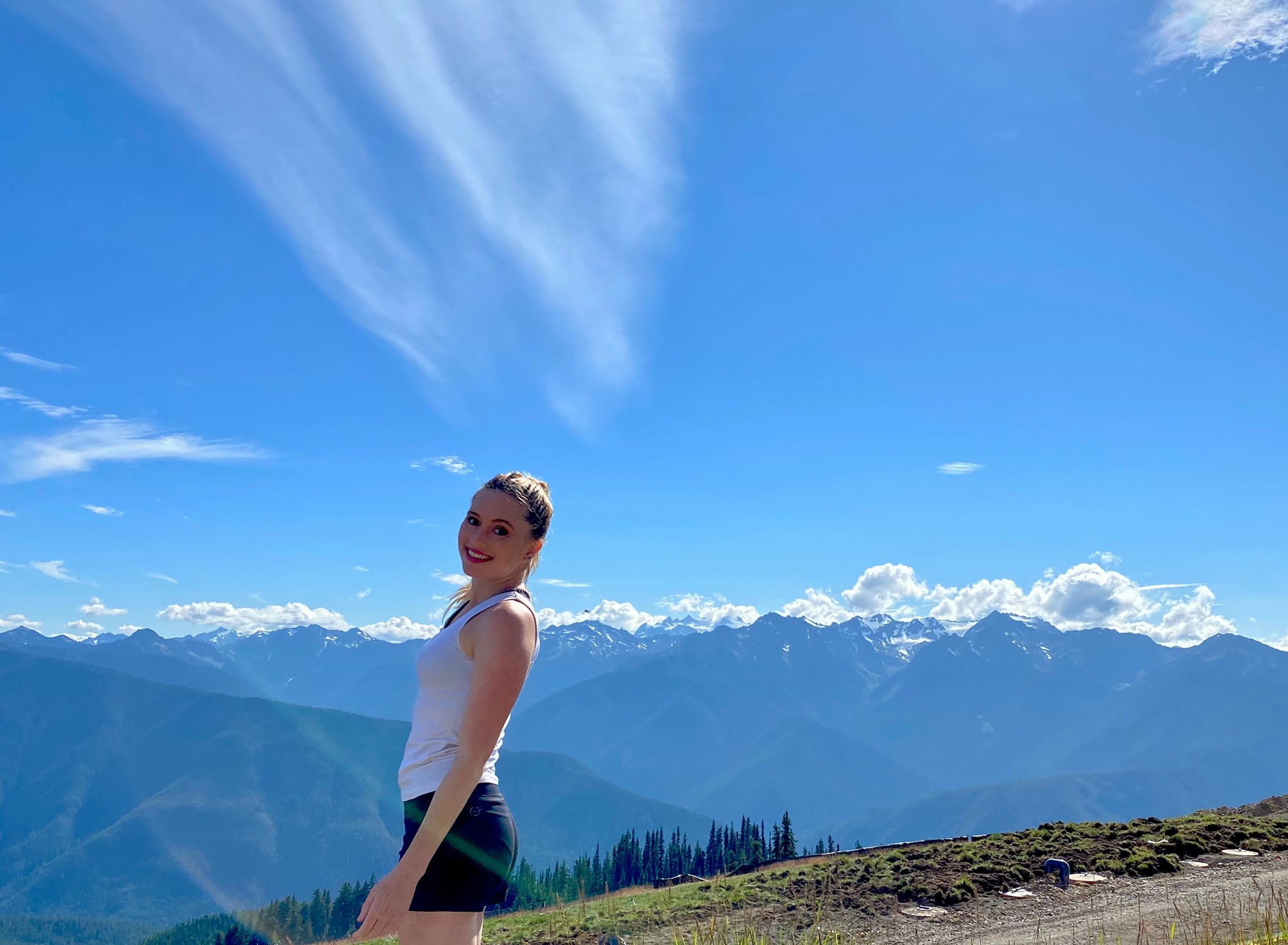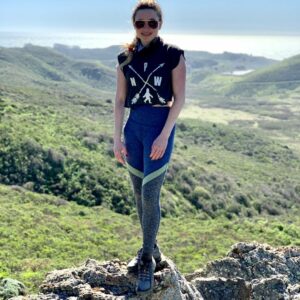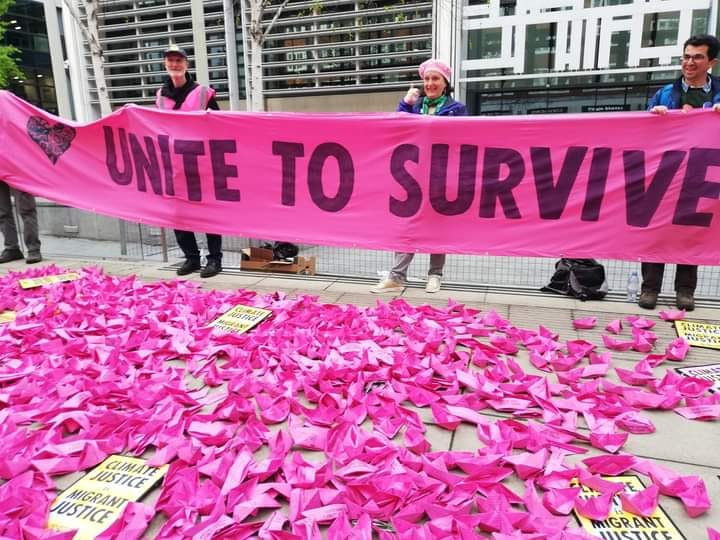
SELF-HELP AND RESILIENCE IN THE DEMOCRATIC REPUBLIC OF CONGO
I interviewed Bertin Kalimbiro from the Democratic Republic of Congo about his work in the Goma region to grow food safely and help people threatened


I interviewed Kelsey Josund about working in Silicon Valley, California and her book Platformed, a futuristic fantasy related to her work experiences. Kelsey says about herself: “I care deeply about the ecosystems that humans impact and that impact us. My writing explores these issues while also following classic coming-of-age arcs in science fiction and fantasy. I’m also very interested in stories and characters that complicate the traditional and familiar, leading me to fairytale retellings from unexpected angles.”
Leslie: Tell us about the work you do for a forest carbon markets startup based in Silicon Valley. What’s the business about?
Kelsey: I work at a startup called Pachama, which is focused on bringing transparency and accuracy to the fairly opaque carbon offsets industry. Our goal is to restore forests to fight climate change. It’s absolutely critical that humans support forest health and regrowth globally–to protect ourselves from the worst of climate change and to protect biodiversity. Companies around the world are beginning to heavily invest in carbon offsets, but if carbon offsets are not trustworthy, this model won’t work. Which is, honestly, as it should be! If you spend money to capture carbon and no carbon is actually removed from the atmosphere, no one wins. This is where we come in: we use data from satellites to monitor, verify, and model forest health over time. This allows us to be sure a forest needs protection before someone pays to protect it, so customers can make good use of their limited environmental budgets, and then ensure it actually continues to be protected going forward. I work on modeling, which means applying cutting-edge machine learning models to this super challenging space.
Leslie: Many environmentalists challenge carbon offsetting because it gives oil & gas companies (as well as people involved in aviation) the excuse they are looking for to continue burning fossil fuels. Recent reports tell us that fossil fuels really must be kept in the ground. For example, the International Energy Agency report has called for no new oil exploration by the end of this year and scientists tell us the direct effect of emissions from flying are probably double what the industry claims. So, as I see it, the problem with offsets is that it allows extra carbon to be pumped into an already overloaded atmosphere. It’s the speed of the carbon rise itself that’s the problem. As the World Meteorological Organisation warns in their latest report New climate predictions increase likelihood of temporarily reaching 1.5 °C in next 5 years | World Meteorological Organization (wmo.int) our current emissions are likely to take us beyond the Paris Agreement soon. The latest IPCC report confirms this.
Kelsey: With offsetting we’re not making an intervention that we claim is all that’s needed to solve climate change, but it seems absurd to me that anyone serious about this issue would argue that forest restoration is a negative. Many of the companies we interact with are actually set on being carbon negative, or neutral through time (like Microsoft, offsetting all emissions in their history by 2050). In both of these cases, there’s no “license” to emit more. For the vast majority of customers, we are a small part of their sustainability plans. Some of them are doing this for marketing purposes; many are doing it pre-emptively, knowing that they will soon face regulations (ie in Europe), and some are doing it in some way related to their actual processes – recognizing that they will face insane costs if/when they have to interact with a changed world.
Pachama’s forest offsetting supports small-scale landholders in remote areas economically, including indigenous communities, and gives them the wherewithal to do what we all know we must — reforest, protect existing forests, support biodiversity, help maintain healthy ecosystems.
The standard forest carbon offset market is lacking the verification step that we provide – as it stands, other players in the area do not ensure supposedly protected forests are actually preserved. All of this is to say that I view the carbon offset market as broken in a smaller way than a lot of the critiques I see in the media, but I feel that Pachama is doing it differently.
Leslie: What are the people you work with like?
Kelsey: The other employees are wonderful. It’s so much fun to work at a company where every single coworker is as excited about trees and the environment as I am. We all constantly swap book and podcast recommendations about cool tree stories and environmental messages, and we trade hike recommendations and pictures of our pets in beautiful places. I’ve never worked somewhere before where it truly feels like we’re all pulling together toward something very important, and I love it.
Leslie: Despite that, you say about your futuristic book Platformed “…wow, I really made male startup employees look like assholes!” What’s it like on a micro level, working as a woman in an overwhelmingly male world? How did you translate that experience into Platformed?
Kelsey: I’ve been super lucky in my own career to have worked at companies that value me as a person and engineer, but I haven’t been totally immune from the ill effects of being a woman in a male-dominated field. At internships, I was often the only woman on the team–it was difficult to separate out my junior status on a project from my gender. Were people doubting my abilities because I was a decade younger or because I was the only woman? It’s impossible to tell. And it’s super tricky to navigate when everyone more senior than you can’t actually relate to your career trajectory. I also had some uncomfortable experiences when interviewing for my first job out of grad school, but I was very happy to see the true colors of a company before I joined their team! One startup founder, for example, sat me down and asked explicitly what he’d have to say to make me cry, because he wanted very tough people on his team, and knew women cried more easily. I mean, come on! I don’t remember how I answered, but they gave me a job offer…and I obviously turned them down.
I made things a little more dramatic in Platformed than what I have experienced, but nothing about gender dynamics in the book is unrealistic. To highlight the power imbalances between younger female employees and older male employees, I have Sara, the protagonist, actually dating her boss. This sort of thing absolutely happens in Silicon Valley. I do think I allowed my female and nonbinary characters to exhibit a more full spectrum of personalities and experiences than the male characters, which was a conscious choice: the media is full of portrayals of male tech workers. I put such people in the background and tried to highlight everyone else.
Leslie: You also say about Platformed, “…everyone in near-future Silicon Valley is depressed (and/or a nihilist).” Why are some privileged males who work in Silicon Valley like that? Isn’t this an indulgence, when the world needs action (and action brings hope, as Greta says, not the other way round). Is it the passivity of sitting in front of screens that produces this negativity?
Kelsey: I don’t think screens or passivity are the problem. The problem is the scope of the challenges that confront us. I think all of us are prone to falling into the belief that there’s nothing we can do–it’s a lot easier to believe our problems can’t be solved than to believe that they can be, and that we must solve them. I have a lot of sympathy for that view. In a lot of cases, it’s self-defense.
But you’re right, it is indulgent! If all you want to do is program video games, that’s fine – but you have to be aware that what you’re doing isn’t moving the world forward in a material sense. A lot of people in Silicon Valley believe they are changing the world, and I suppose that in some sense, they are, but not necessarily in a good way. We shouldn’t fool ourselves into thinking that every problem can be solved via tech, or that every problem we solve with technology deserves to be solved that way. However, we need to escape from the trap we have set for ourselves: I don’t know who said it, but I’ve seen a quote floating around about the greatest minds in our generation working on ad optimization. That’s tragic. That’s allowing people with immense skills and abilities to look away from the epic challenges of our day and instead focusing on tiny, well-defined, tractable problems. I know so many people who just want a job where they can work all day and then tune out, solving fun technical challenges that don’t actually mean anything. I know many more who want to solve grand problems, especially ones we as Silicon Valley have created for ourselves–things like removing bias from our existing technology. This is a step in the right direction, but it’s a little incestuous.
We have much greater problems that confront us, as the pandemic has made clear, and as the planet is making even more clear. If we turn away from these challenges, saying that there’s nothing we can do and that we as individuals don’t matter, we might feel better right up until the moment that these challenges kill us.
Leslie: How have you tried to escape this negativity and how did your strong relationship to nature begin? What helps people to experience nature in a respectful, non-exploitative way?
Kelsey: I can’t remember a time when I didn’t love nature. My mom has worked in environmental advocacy, including forest conservation, my whole life, and my dad runs a small construction company focused on eco-building. I grew up going camping and spending tons of time outside; my favorite memories from childhood are all outdoors. I slipped away from this a bit in college, becoming enamored with the rush and possibility of tech, but pretty quickly found my way back.

I am a very solutions-oriented person. Problems only overwhelm me until I start working to solve them. My defense mechanisms have always been to do something, even if it’s a tiny drop in the bucket in comparison to the scope of the problem. My mentality has always been that whatever happens, happens, and I can be okay with it as long as I know that I did as much as I possibly could. This is very hard to apply to climate change, because you can always do more! I could be living off the land, emitting almost nothing, but instead I live in an American city. I definitely feel guilt about it, but I minimize my impact where I can, and I recognize that ultimately those most complicit for the problems we’re facing are megacorporations which I am not accountable for. It’s a constant struggle to keep my anxiety in check and keep moving forward.
As for nature…I don’t have any specific advice. Caring about the environment seems so self-evidently necessary to me. I have always compulsively collected the trash I see. I’ve bought carbon offsets as long as I’ve had my own independent life. Back when I had a commute, I commuted by bike. I’ve always loved the smell of rain and the feel of pine needles under my feet, and I don’t know how to help people appreciate the natural world the way I do except to share it with them.
Leslie: You also say about Platformed: “Yes, tech bros, I took some cheap shots at crypto and self-driving cars… And also Stanford and Berkeley, though I think they deserve it.” Can you explain, please, your objections to crypto, self-driving cars and the institutions you name?
Kelsey: It’s not an explicit objection to crypto or self-driving cars, Stanford or Berkeley, San Francisco or VCs or anything else, as much as the sense that it’s very easy to fall under the Silicon Valley spell when you live here. NFTs and crypto-currencies are terrible for the environment. They’re interesting; the blockchain has some very cool democratization implications. But we can’t let ourselves believe that it will solve our problems without creating new ones, and we shouldn’t indulge in speculation for fun at the expense of our future. Self-driving cars have a slightly different nuance: they’re great. It’s a worthy challenge to solve. I drive a Tesla with autopilot all the time, and it’s wonderful! But fully self-driving vehicles are very overhyped, and have been reported to be a few years away for many years now. I think they’re emblematic of a lot of the problems in Silicon Valley, where some new technology is presented as far simpler than it actually is, and far easier to scale, and far more impactful. Platformed takes place in the 2030s, and I include human-driven cars. I don’t think it’ll be fifteen years before we have fully self-driving cars on the road, but I do think that fifteen years from now we’ll still be driving ourselves a lot of the time.
And as for the grand institutions of Silicon Valley…I think Stanford, especially, is often romanticized. I myself was utterly awed when I first stepped foot on campus. There’s a kind of magic there. You walk around Palo Alto and see so many places where amazing things happened. You take classes from Nobel Prize winners and inventors of the algorithms you’re studying. It’s incredible. But Stanford is, fundamentally, a conservative, overly self-conscious institution. They are always worried about how they will be perceived, sometimes at the expense of progress and their students. They haven’t yet divested from fossil fuels, which is just crazy to me. They build all these futuristic energy buildings on campus and yet house the Hoover Institution. It’s not neutral to be on “both sides” of a lot of modern issues; it’s broken. Over the course of my six years at Stanford, I began to see its flaws. There’s much to be praised, but it’s not as perfect as the media portrays it to be, all sunshine and palm trees and inventions. It’s also boardrooms and bureaucracy and hesitation.
Leslie: How do you build a story, step-by-step? What are your daily writing routines and what helps/hinders your writing?
Kelsey: Usually, my stories start with a scene and a character. I often pour out a pretty complete outline in a couple hours once it all hits me, and get most of the general plot and themes worked out quite quickly. At this point, I haven’t yet seen any plot holes or hang ups that I will confront through the process of actually writing–those reveal themselves later. I’ve written before about how similar writing a story is to writing code, and I think this is a great example of how this can be true! In both cases, I dash out the general idea of what I want to do, and then have to work through the edge cases and complicated pieces as I go. I’m not good at finding these issues in advance, but I always find them eventually.
I write in the evenings. Since working from home due to covid, I have a much nicer setup: a big monitor and nice keyboard at an actual desk, not just my laptop at the dining room table. I don’t think that setup makes me write any faster but it definitely makes me have less of a crick in my neck. I write quite quickly, usually a couple scenes each evening, dashing out maybe 3000 words in an hour and a half. When I have more time to write, I don’t actually get much more done–I think I burn through the scenes that have been forming in my mind, and start having to work a lot harder for the inspiration. Outlining, though, I can do all day (and I always want to)–if I have a new story to architect, I try to give myself an entire Saturday to plan and plot it out.
Leslie: What are the similarities between your computing work and writing fiction? How do they differ?
Kelsey: Both are very creative processes, focused on writing clearly and solving problems. There’s actually a lot in common between writing a story and writing code; I always feel like I’m using my brain in a similar way. The rewards that come from fiction and from programming are very different, though. I know I can feel the little bursts of dopamine whenever something works, while debugging software (or rushes of relief, if I’ve been up against something tricky for a long time), whereas when writing a story the joy of it is a smoother process. There are not the same distinct moments of frustration and elation the way there are while writing code.
Leslie: What events and people have made you think hardest about climate and ecological breakdown? How has this understanding changed your own activities, feelings & lifestyle?
Kelsey: I remember learning about climate change for the first time in seventh grade science class. The greenhouse effect awed me, and the implications were horrifying. But in the same lesson we learned about the hole in the ozone layer, and how countries had come together to fix it in the ’90s. I thought everything would soon be solved and it would not be a problem for me by the time I was an adult. That obviously wasn’t true!
Another very strong memory, also in a classroom, was during a public policy class I took freshman year of college. We were learning about the formation of the Environmental Protection Agency, and I was shocked by both the complexity of its creation, the depth of the failures of our regulatory bodies, and the fact that all of the environmental legislation in the ’70s was so bipartisan! It struck me that we can do a lot of good, but that ultimately when we fail, it’s someone’s choice to stop it. Our air and water is so much cleaner today than it was fifty years ago, a triumph of environmental control that we today don’t fully appreciate. But a lot of people don’t believe that the government could do something on that scale anymore, which is tragic.
I guess what I’ve learned from these and other experiences is that policy and cooperation are very, very hard. This should be an issue we can all agree on: you’d think the air we breathe and climate we experience would be more important than profits, especially when environmental catastrophes hurt the economy on a massive scale. But somehow it isn’t, and that’s what drives me to try to engage with these issues in a different way–through a for-profit company instead of a nonprofit, and through fiction rather than articles. We’re not going to bring people around just through advocacy and education. We have to appeal to their pocketbooks — we still have a capitalist system! — and their hearts, through stories.

Leslie: Why did you write Platformed? What’s the importance of the title, what’s the message the book sends – and is there more to it than an ideas platform?
Kelsey: I wrote Platformed for the same reason I write all of my stories (of which there will be more out in the world soon) — because I had to get it out of my head! But I decided to publish it as my debut novel because it seems most fitting to our times out of all of my manuscripts. I see few protagonists like me in fiction — female software engineers; privileged tech workers who don’t buy into the meritocratic ideal of Silicon Valley. I relate to Sara a lot–I feel like she could be any number of people I know. I wanted her story to be told. The louder message of the story, too, I felt needed to be out there–the precarity of Silicon Valley, the extent to which its mythologized startups are overpowered by behemoths, the fact that this place is not just companies and insulated tech workers but a lot of other people, too. Climate change is coming for us even in the most expensive zip code in America, and very few of us who live here are working on it.
As for the title, it has a few meanings. One of them, obviously, has to do with the giant tech platforms that we all spend our waking hours interacting with. Currently, we can avoid these platforms by engaging with the physical world; in Platformed, they have extended their influence into every part of life, providing food and shelter on top of everything else. Another is the very related concept of a platform for communication, as in an avenue to disseminate ideas–the character is lacking such a platform, and so is everyone she interacts with. Me writing this story was giving them one. The final meaning is more physical: the Community that Sara enters is actually located upon a floating platform, stretching over what was once farmland but has now been swallowed by the rising seas.
Next week I interview Lulah Ellender whose first book, Elisabeth’s Lists: A Life Between the Lines was one of The Spectator’s Books of the Year
ABOUT LESLIE TATE’S BOOKS:

I interviewed Bertin Kalimbiro from the Democratic Republic of Congo about his work in the Goma region to grow food safely and help people threatened

I interviewed computer expert and sustainability campaigner Dr Erlijn van Genuchten, who writes easy-to-understand books based on science full of practical suggestions for planet-friendly living.

I interviewed Canadian cartoonist Dawn Mockler about how she works on cartoons that might be environmental or wordless but always witty – especially her famous

I inteviewed Helen M Stevens about how she has revived the art of embroidery, creating original contemporary patterns while studying and drawing on, “One of

I interviewed Councillor Rachel Smith-Lyte about the origins of her passion for nature and her environmental activism. Rachel tells the story of her teaching (and
| Cookie | Duration | Description |
|---|---|---|
| cookielawinfo-checkbox-analytics | 11 months | This cookie is set by GDPR Cookie Consent plugin. The cookie is used to store the user consent for the cookies in the category "Analytics". |
| cookielawinfo-checkbox-functional | 11 months | The cookie is set by GDPR cookie consent to record the user consent for the cookies in the category "Functional". |
| cookielawinfo-checkbox-necessary | 11 months | This cookie is set by GDPR Cookie Consent plugin. The cookies is used to store the user consent for the cookies in the category "Necessary". |
| cookielawinfo-checkbox-others | 11 months | This cookie is set by GDPR Cookie Consent plugin. The cookie is used to store the user consent for the cookies in the category "Other. |
| cookielawinfo-checkbox-performance | 11 months | This cookie is set by GDPR Cookie Consent plugin. The cookie is used to store the user consent for the cookies in the category "Performance". |
| viewed_cookie_policy | 11 months | The cookie is set by the GDPR Cookie Consent plugin and is used to store whether or not user has consented to the use of cookies. It does not store any personal data. |